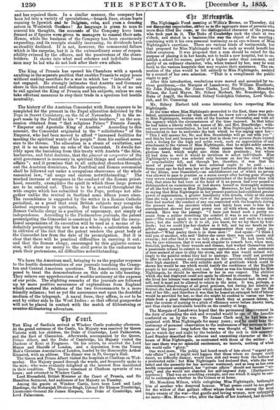The history of the Austrian Concordat with Rome appears to
be completed for the present in the Papal allocution delivered by the Pope in Secret Consistory, on the 3d of November. It is the re- port made by the Pontiff to his " venerable brothers," on the con- cession obtained from " that religious Prince" Francis Joseph, " Emperor and Apostolic King of Austria." According to this account, the Concordat originated in the " solicitations" of the Emperor, who had been moved to afford " increased facilities for meeting the spiritual wants of his people " from his earliest acces- sion to the throne. The allocution is a strain of exultation, and yet it is no more than an echo of the Concordat. It dwells for- cibly upon the banishing from this treaty with Austria "the false, barbarous, and fatal doctrine, that the placeat or exequatur of the civil government is necessary in spiritual things and ecclesiastical affairs "; and it promises that in all cathedral churches through- out the Austrian dominions, the Pontifical and Roman ceremonial shall be followed out under a scrupulous observance of the whole canonical law, "all usage and custom notwithstanding." The marked increase of arrogance in the conduct of the Roman priest- hood, recently, exemplifies the spirit in which those large powers are to be carried out. There is to be a revival throughout the wide empire which has submitted to the Pope, perhaps not alto- gether unlike the revival in Scotland some fifteen years since. The resemblance is suggested by the writer in a Roman Catholic periodical, as a proof that even British subjects may recognize clerical supremacy in spirituals. But the Concordat places the Roman Catholic clergy in a position of supremacy, not simply of independence. According to the Piedmontese journals, the patent promulgating the Concordat is construed to imply that the excep- tional suspensions of its execution will be used as a means of in- definitely postponing the new law as a whole; a calculation made in oblivion of the fact that the patent renders the great body of the concordat law from the date of its promulgation. But it is clear that there will be practical difficulties in carrying it out ; and that the Roman clergy, encouraged by this gigantic conces- sion, will show no mercy to the civil power in the endeavour to push their pretensions, all difficulties notwithstanding.


























 Previous page
Previous page